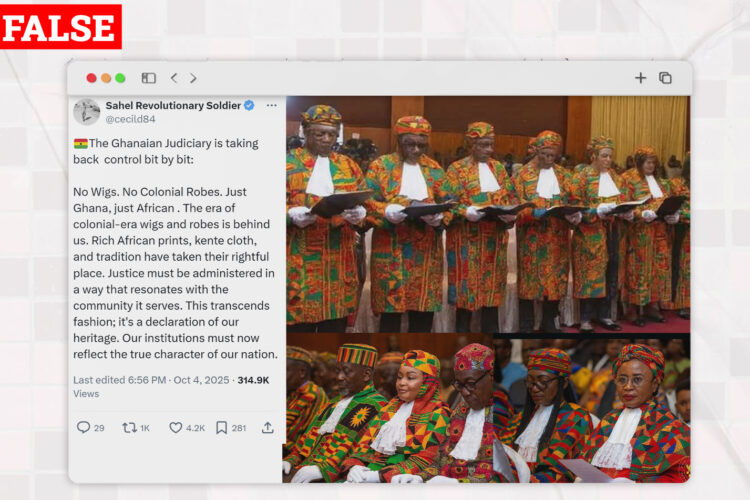Ghana’s Judiciary Has Abolished The Use of Wigs And Colonial-Style Robes
Kingsley Okon
On October 4, 2025, an X user @cecild84 claimed that Ghana’s judiciary has discarded colonial-era wigs and robes in favour of African prints and traditional attire. The post had three images of lawyers in traditional African prints attire, captioned: “🇬🇭The Ghanaian Judiciary is taking back control bit by bit: No Wigs. No Colonial Robes. Just Ghana, just African. The era of colonial-era wigs and robes is behind us. Rich African prints, kente cloth, and tradition have taken their rightful place. Justice must be administered in a way that resonates with the community it serves. This transcends fashion; it’s a declaration of our heritage. Our institutions must now reflect the true character of our nation”
When this report was published, this claim had about 312,600 views and over 5,500 replies, reposts, quotes, likes and bookmarks. In the comment section, @Martin_Lionmane said “Kenyan Judiciary watches this like a movie” and @OmarBlaksmith wrote “Much better, much better!”
VERIFICATION
In 2017, the former Chief Justice of Ghana, Ladyship Justice Sophia Akuffo, issued a directive reinforcing the mandatory wearing of wigs and gowns in all courts. The directive emphasised the need to maintain decorum and preserve judicial tradition. When Justice Kwasi Anin-Yeboah was nominated for Chief Justice in 2019, he clearly stated he would not remove the tradition of wigs, gowns, and formal court attire. In 2021, Justice Anin-Yeboah maintained that judges and magistrates comply with regulation to wear a wig and gown.
Before her Supreme Court appointment in 2019, Justice Gertrude Torkornoo, expressed her wishes that judges might wear more local fabrics or African prints instead of always heavy black gowns etc., especially given Ghana’s climate. In 2025, Supreme Court nominee Justice Dennis Dominic Adjei defended the use of wigs and gowns, saying they are essential symbols of judicial identity and professionalism.
However, there has been no binding policy changes, official circular, government press release, or judicial amendment as of October 2025 that abolishes wigs and colonial robes. Only proposals, statements, or preferences by individuals have been aired.
To verify the origin of the images in the claim, NV-A carried out a reverse search using google lens and while the image appeared online recently here, here and here; it is not connected to any recent event in Ghana. An analysis of the imprint on the images also revealed a variation in the language used on the inscription, compared to the official imprint typically associated with the Government of Ghana.


Imprint on images in the claim Emblem of the Republic of Ghana Presidency
Additionally, checks on Hivemoderation suggest that the images may have been manipulated using AI.
CONCLUSION
The claim that The Ghanaian Judiciary has stopped wearing colonial-era wigs and robes and now dresses in African-styled robes is FALSE. There is no official decision or policy abolishing wigs and robes in Ghana’s judiciary. While a few judges and commentators have voiced support for adopting African prints or lighter local attire, these remain personal opinions, not judicial reforms.


